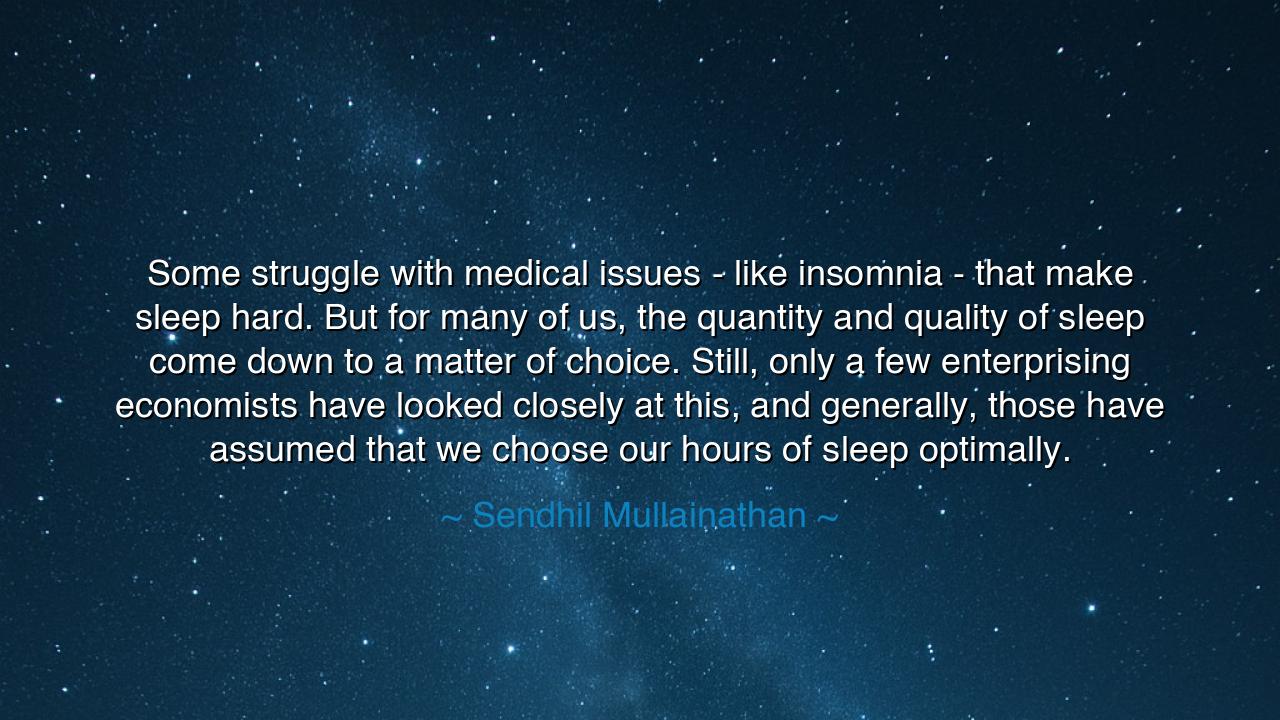
Some struggle with medical issues - like insomnia - that make
Some struggle with medical issues - like insomnia - that make sleep hard. But for many of us, the quantity and quality of sleep come down to a matter of choice. Still, only a few enterprising economists have looked closely at this, and generally, those have assumed that we choose our hours of sleep optimally.






When Sendhil Mullainathan observed, “Some struggle with medical issues — like insomnia — that make sleep hard. But for many of us, the quantity and quality of sleep come down to a matter of choice. Still, only a few enterprising economists have looked closely at this, and generally, those have assumed that we choose our hours of sleep optimally,” he gave voice to an eternal paradox: the simplest acts of life — rest, nourishment, balance — are often neglected, though they are the very foundation of strength. His words remind us that while some are bound by the chains of illness, many others squander their well-being by poor choices, believing themselves to be masters of time, yet secretly enslaved by their own neglect.
The meaning of this reflection lies in the delicate boundary between fate and will. For there are those who truly suffer from medical issues, their bodies denying them the healing balm of sleep. To them, compassion and treatment are owed. Yet for the multitude who are not bound by such ailments, the lack of rest is a self-inflicted wound. Late hours, glowing screens, endless labors — these are not the decrees of nature, but the indulgences of man. Mullainathan reminds us that the choice of rest is as important as the choice of work, and that in failing to choose wisely, we rob ourselves of clarity, strength, and peace.
The ancients knew well the sacredness of sleep. Homer sang of Sleep and Death as twin brothers, both powerful, both inexorable. The philosophers of Greece and Rome counseled moderation in waking and resting alike. Even Marcus Aurelius, emperor of the world, rebuked himself in his Meditations when he resisted rising from bed: “You were born to act, not to lie warm under blankets.” Yet he also cherished the cycles of sleep, recognizing it as nature’s law. To obey the rhythms of the body was not weakness but wisdom. Thus, Mullainathan’s insight is but the modern echo of this ancient truth: that rest is not idleness, but the fuel of greatness.
Consider the cautionary tale of Napoleon. Though brilliant in battle, he often boasted that he required only a few hours of sleep each night. His rivals, however, such as Wellington, observed with clarity and patience, refreshed by longer rest. In the end, at Waterloo, it was not only strategy but exhaustion that weighed upon the French emperor. His overconfidence in choosing sleeplessness as a badge of strength became a weakness. The lesson is clear: even the mightiest fall when they defy the body’s need for restoration.
Mullainathan also points to the curious neglect of economists, who calculate the value of labor, consumption, and leisure, yet often assume that men choose their sleep with wisdom. But the truth is otherwise: men trade rest for illusion, sacrifice renewal for fleeting gain, and in so doing diminish the very productivity they seek. What folly it is to believe that cutting hours from sleep adds to life’s wealth, when in truth it subtracts from life’s vitality! Here is the irony: we seek to master time, but time masters us, and sleep is its most unyielding law.
The lesson to future generations is thus carved in bold letters: honor your sleep as you honor your work. To rest is not to waste, but to invest in strength, clarity, and endurance. Do not treat rest as the servant of ambition, but as its foundation. In a world that tempts us with constant light and endless toil, the discipline of retreat into darkness and silence becomes an act of courage. To choose sleep wisely is to choose life wisely.
Practical actions must flow from this wisdom. Set boundaries on your labors, for no work thrives in the hands of the weary. Guard the sanctity of your nights, resisting the glowing distractions that steal away the hours. Approach sleep as a sacred rhythm, aligning yourself with nature rather than with ceaseless demands. And above all, remember that to respect your body’s need for rest is to show respect for your own potential.
Thus Mullainathan’s words endure as a lamp in the modern age: sleep is both necessity and choice, both nature’s gift and man’s responsibility. To squander it is folly; to embrace it is wisdom. May you, children of tomorrow, learn to value rest not as weakness, but as strength hidden in silence — the forge in which the mind is sharpened and the spirit renewed.






AAdministratorAdministrator
Welcome, honored guests. Please leave a comment, we will respond soon